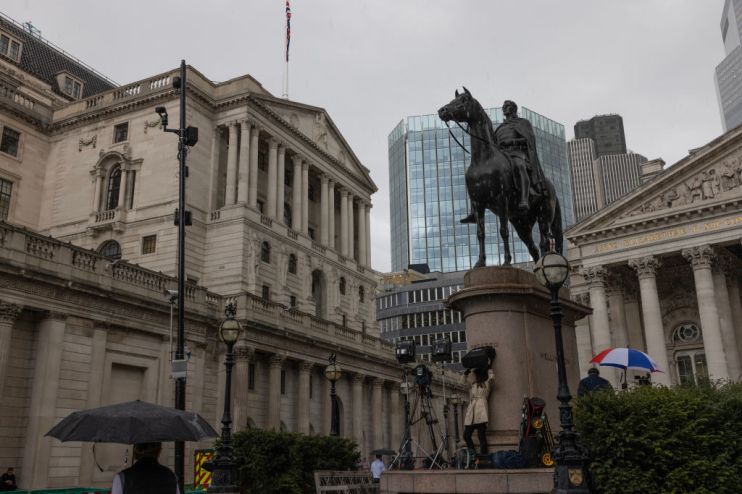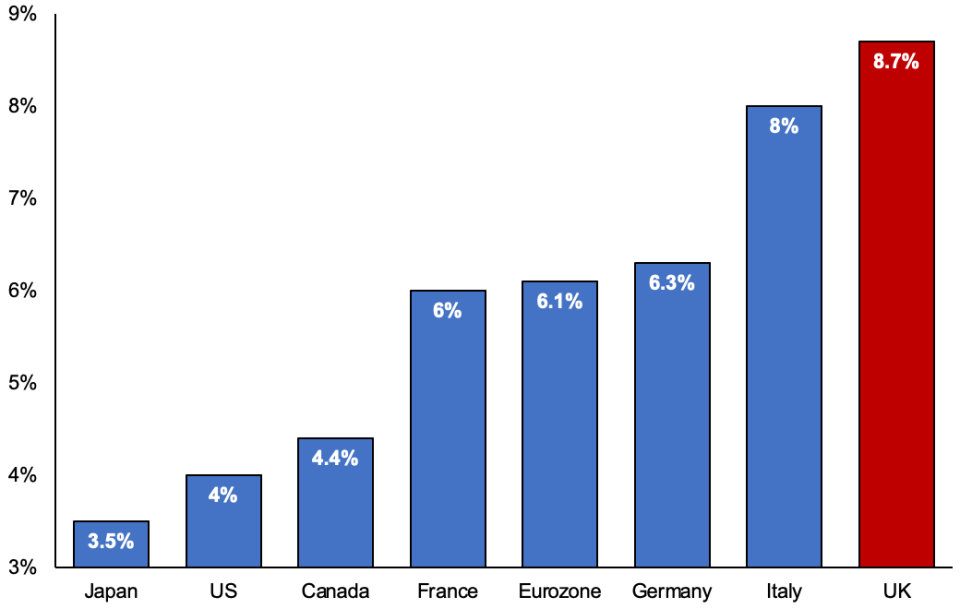UK inflation smashes forecasts again raising chances of larger Bank of England interest rate hike

UK inflation is still outpacing experts’ predictions and is running at a level that could lure the Bank of England into an outsized interest rate hike tomorrow, heaping more pain on families and businesses.
Official figures out this morning from the Office for National Statistics (ONS) showed the rate of price hikes held steady at 8.7 per cent in May.
However, the City thought the rate would trim to 8.4 per cent, extending a long streak in which inflation has breached analysts’ forecasts.
London’s FTSE 100 finished 0.13 per cent lower today at 7,559.17 points, while pound sterling weakened 0.2 per cent against the US dollar.
Underlying price pressures are still hanging around, suggesting the Bank’s prior rate increases have yet to make a meaningful dent in the rising cost of living.
Core inflation rose again and to a 31 year high of 7.1 per cent from 6.8 per cent in the previous month.
Persistently high core inflation – which strips out volatile food and energy prices – will concern Bank Governor Andrew Bailey and the rest of the monetary policy committee (MPC), probably forcing them into a 13th straight interest rate rise at midday tomorrow.
Before today’s inflation numbers, the City thought the Bank would lift borrowing costs 25 basis points to 4.75 per cent, though some corners of the market thought a larger 50 point increase would be more appropriate.
Markets now think rates will peak at at least six per cent, a level they haven’t been since 2000. They also think there’s a two in five chance the MPC will opt for 50 basis point increase tomorrow.
Inflation is stuck at nearly nine per cent

Evidence of price pressures withstanding the toughest tightening cycle since the 1980s suggests they are beginning to be driven by domestic factors. Though inflation was running at five per cent heading in 2022, Russia’s invasion of Ukraine turbocharged prices by jolting international energy markets.
Goods inflation is also running at 9.7 per cent. Food inflation dropped to 18.3 per cent from 19 per cent.
“Today’s data will likely leave the Bank of England with no choice but to opt for another increase in the base rate tomorrow,” Yael Selfin, chief economist at KPMG UK, said.
Experts thought a few members of the nine-strong MPC would back a larger rate increase tomorrow even before today’s hot inflation data.
“There’s a clear risk, in our view that the majority swings behind such a move,” analysts at HSBC said.
Kitty Ussher, chief economist at the business lobby group the Institute of Directors, said: “The rise in core inflation shows we are not yet out of the woods, meaning there is little doubt the Bank of England will raise rates tomorrow; the question is by how much.”
Selfin added that the Bank may need to steer the economy into a recession “to bring inflation back to [the two per cent] target”.
Chancellor Jeremy Hunt said the government “will not hesitate in our resolve to support the Bank of England as it seeks to squeeze inflation out of our economy”.
Inflation rates in the rich world

He and Prime Minister Rishi Sunak have pledged to halve inflation to around five per cent by the end of this year.
Higher borrowing costs, in theory, trim demand by making it more attractive to save and more expensive to borrow, which tempers price rises.
Britain’s inflation rate is much higher than the US and Europe’s, prompting financial markets to ratchet up their bets of late on how high Governor Bailey and co will send rates to rid it from the system. Just last month, borrowing costs were expected to peak around 4.75 per cent.
Yields on UK debt have shot up above their post-mini-budget levels to their steepest rate since the middle of the 2008 financial crisis. The yield – which moves inversely to its price – on the 2-year gilt jumped 10 basis points today.
Such bets have forced mortgage rates up sharply to more than six per cent, raising concerns that the UK could slip into recession.
The rump of the effects of the Bank’s prior rate increases are likely to surface as the year progresses as homeowners roll on to new mortgages with more punitive monthly repayments.
Resolution Foundation economists have estimated the average annual mortgage bill for Brits switching on to new contracts will jump £2,900 next year, fashioning a spending slowdown that will weigh on economic growth.
Similarly, experts at the Institute for Fiscal Studies today said 1.4m homeowners will lose 20p in every £1 of their disposable income when they remortgage.
There are some signs that inflation could finally start falling quickly in the coming months. Prices for materials used by factories rose by just 0.5 per cent over the last year, down from an increase of 4.2 per cent.